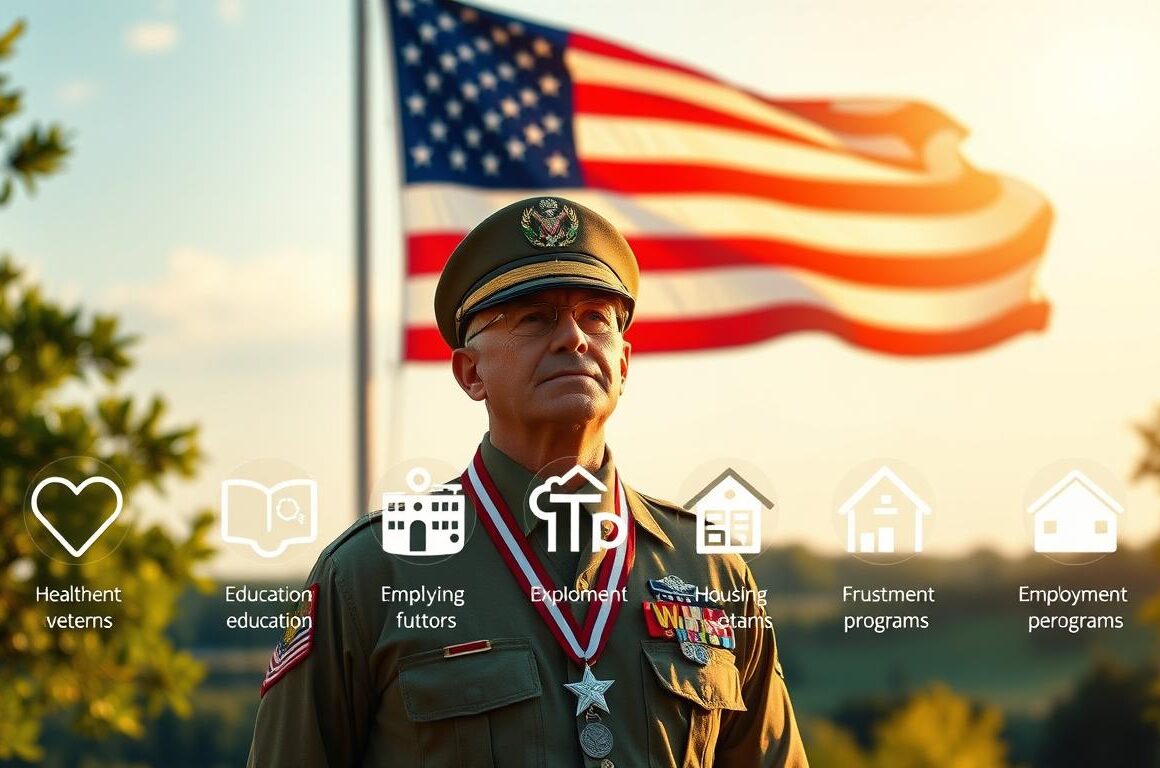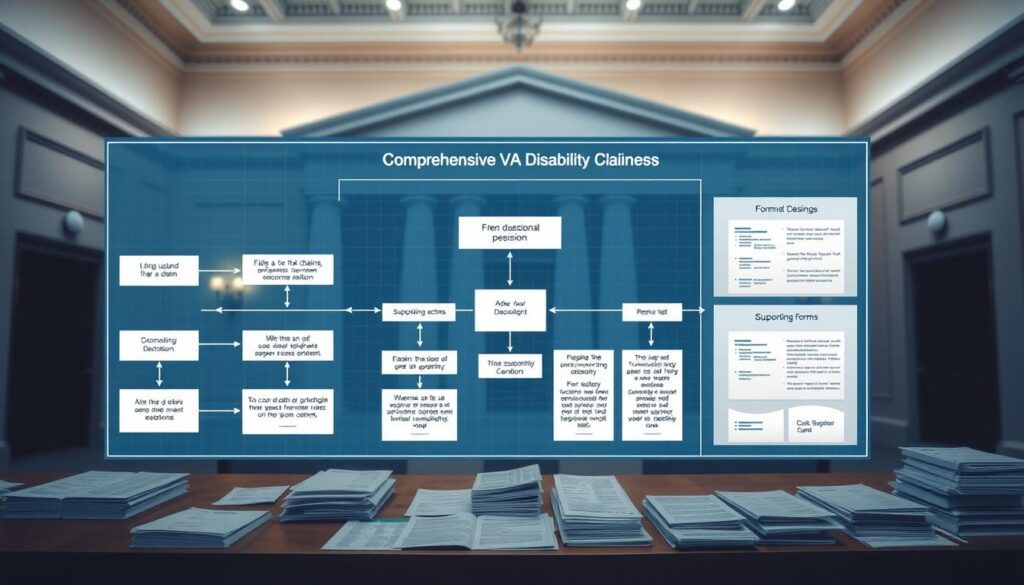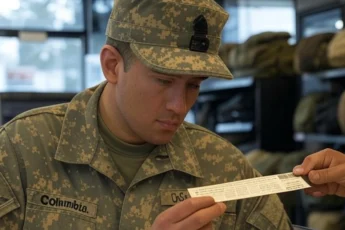Veteran Benefits & Resources in the US

As a veteran, I’ve come to understand the importance of accessing available benefits and resources.
In this article, I will provide a comprehensive guide to US veteran benefits and resources, covering various aspects such as healthcare, disability compensation, and education.
My goal is to help navigate the complex system and make the most of available benefits, ensuring a smoother transition to civilian life.
Key Takeaways
- Understanding available benefits and resources
- Navigating the complex system with ease
- Accessing healthcare and disability compensation
- Education benefits for a brighter future
- Resources for a successful transition to civilian life
Understanding the US Veteran Benefits System
As a veteran, understanding the benefits available through the US Veteran Benefits System is essential. The system is designed to provide support to military veterans in various aspects of their lives.
Who Qualifies as a Veteran in the United States
To qualify as a veteran in the United States, an individual must have served in the military and been discharged under conditions other than dishonorable. The specific requirements can vary depending on the benefit, but generally, veterans include those who have served during wartime or peacetime. Veteran services are available to help individuals determine their eligibility.
Overview of Major Benefit Categories
The US Veteran Benefits System offers several major benefit categories, including healthcare, disability compensation, education, and employment assistance. These benefits are designed to support veterans in their transition back to civilian life and provide ongoing support as needed. Veterans can access these benefits by applying through the relevant veteran services channels.

VA Healthcare Benefits for Veterans
The VA healthcare system offers a wide range of benefits designed to support veterans in maintaining their health and well-being. As a veteran, accessing these benefits can be a crucial step in ensuring you receive the medical care you need.
VA Health Care Enrollment Process
To access VA healthcare benefits, veterans must first enroll in the VA health care system. This process involves submitting an application, which can be done online, by phone, or in person at a VA medical center. Veterans will need to provide personal and service information to determine their eligibility.
Key steps in the enrollment process include:
- Gathering required documents, such as discharge papers and medical records
- Completing the online application or visiting a VA facility
- Receiving a decision on eligibility from the VA
Available Medical Services and Facilities
Once enrolled, veterans have access to a comprehensive range of medical services. These include primary care, specialty care, mental health services, and more. The VA operates numerous medical centers and clinics across the country, ensuring that veterans can access care in their local communities.
The VA healthcare system is designed to be flexible and responsive to veterans’ needs, with services tailored to address a wide range of health concerns.

Prescription Benefits and Medication Coverage
Veterans enrolled in the VA healthcare system also receive comprehensive prescription benefits. The VA covers a wide range of medications, ensuring that veterans can manage their health conditions effectively. Prescriptions can be filled at VA pharmacies or through the mail-order pharmacy service.
As highlighted by a veteran’s testimony, “
The VA healthcare system has been a lifeline for me, providing access to the medical care and support I need to manage my condition.
” This underscores the importance of the VA’s role in supporting veterans’ health.
Disability Compensation and Claims
The United States Department of Veterans Affairs (VA) offers disability compensation to veterans who have injuries or conditions incurred during or aggravated by military service. As a veteran, understanding the process of disability compensation and claims is essential to ensure you receive the benefits you deserve.
Determining Service-Connected Disabilities
A service-connected disability is a condition that was caused or worsened by military service. To qualify for disability compensation, veterans must have a current diagnosis of a disability that is linked to their military service. The VA uses a rating system to determine the severity of the disability and the corresponding compensation amount.
Key factors in determining service-connected disabilities include:
- A clear diagnosis of the condition
- Evidence that the condition was caused or aggravated by military service
- The severity of the condition
As stated by the VA, “a service-connected disability is a condition that was incurred or aggravated in the line of duty in the active military, naval, or air service.”
“To establish service connection, there must be evidence of a current disability; evidence of an in-service event, injury, or disease; and a nexus between the in-service event and the current disability.”
Filing a VA Disability Claim
Filing a VA disability claim involves several steps, including gathering evidence, submitting an application, and awaiting a decision from the VA. It’s crucial to provide thorough documentation to support your claim.
| Required Documents | Description |
|---|---|
| Service Treatment Records | Medical records from your time in service |
| Private Medical Records | Records of treatment received outside the VA |
| Discharge Papers (DD214) | Proof of military service and discharge status |
Appeals Process for Denied Claims
If your disability claim is denied, you have the right to appeal the decision. The appeals process involves several stages, including filing a Notice of Disagreement and potentially attending a hearing.

Understanding the appeals process can be complex, but it’s a crucial step in securing the benefits you deserve. As I guide you through this process, remember that persistence and thorough preparation are key.
Education and Training Opportunities
Transitioning to civilian life can be challenging, but education and training benefits can make a significant difference for veterans. The U.S. government provides various programs to support veterans in their educational and career pursuits.
“The Post-9/11 GI Bill has been a game-changer for many veterans, providing them with the financial support needed to pursue higher education,” says a veteran who benefited from the program.
Post-9/11 GI Bill Benefits
The Post-9/11 GI Bill is a comprehensive education benefit program for veterans who have served on active duty for at least 90 days since September 10, 2001. It covers tuition and fees, provides a monthly housing allowance, and offers a stipend for books and supplies.
Key Benefits:
- Tuition and fee coverage
- Monthly housing allowance
- Annual stipend for books and supplies
Montgomery GI Bill Options
The Montgomery GI Bill is another education benefit program available to veterans. There are two main types: the Montgomery GI Bill Active Duty (MGIB-AD) and the Montgomery GI Bill Selected Reserve (MGIB-SR). These programs provide education benefits to eligible veterans who have contributed to the program while serving in the military.
Vocational Rehabilitation and Employment Programs
The Vocational Rehabilitation and Employment (VR&E) program is designed to help veterans with service-connected disabilities prepare for, find, and keep suitable jobs. The program offers a range of services, including vocational counseling, education and training, and employment assistance.
By leveraging these education and training opportunities, veterans can enhance their career prospects and achieve their personal goals. It’s essential for veterans to explore these resources and utilize the support available to them.
Employment Resources for Military Veterans
The US government offers numerous employment resources and benefits to help military veterans secure jobs and start their own businesses. These resources are designed to support veterans in their transition to civilian life, acknowledging their service and sacrifices.
One of the key employment benefits for veterans is the preference they receive in federal hiring processes. This preference is a significant advantage, as it increases their chances of being selected for federal job openings.
Veteran Preference in Federal Hiring
Veteran preference in federal hiring is a longstanding policy that gives eligible veterans an advantage when applying for federal jobs. To be eligible, veterans must meet specific service requirements and, in some cases, have a service-connected disability. This preference can be a decisive factor in the hiring process, especially when candidates are equally qualified.
A table outlining the types of veteran preferences in federal hiring is as follows:
| Preference Type | Description | Eligibility Criteria |
|---|---|---|
| 5-Point Preference | Given to veterans who served during a war or in a campaign or expedition for which a campaign badge is authorized. | Honorable discharge, served during a war or specific campaign. |
| 10-Point Preference | Granted to disabled veterans or their spouses, and to the mothers of veterans who are disabled or deceased. | Disabled veterans, spouses of disabled veterans, mothers of certain veterans. |
Job Training and Placement Services
In addition to veteran preference, the government offers job training and placement services tailored to veterans’ needs. These services include resume building, interview preparation, and job placement assistance, all aimed at helping veterans find employment that matches their skills and experience.
Entrepreneurship Support Programs
For veterans interested in starting their own businesses, there are entrepreneurship support programs available. These programs provide training, mentorship, and financial assistance to help veterans turn their business ideas into successful ventures.
By leveraging these employment resources, military veterans can significantly enhance their career prospects and achieve a successful transition to civilian life.
Housing and Home Loan Benefits
The US government offers several housing and home loan benefits to support veterans in their journey to homeownership. These benefits are designed to make owning a home more accessible and affordable for those who have served.
Veterans may be eligible for various programs that provide financial assistance and favorable loan terms. Two significant benefits are the VA Home Loan Guaranty Program and housing grants for disabled veterans.
VA Home Loan Guaranty Program
The VA Home Loan Guaranty Program is a vital benefit that helps veterans achieve homeownership with favorable loan terms. This program guarantees a portion of the loan, making it easier for veterans to qualify for a home loan with a lower interest rate and no down payment requirement. Key advantages include:
- Lower Interest Rates: VA-backed loans often have more competitive interest rates.
- No Down Payment: Veterans can purchase a home without making a down payment.
- Reduced Mortgage Insurance: The VA guarantee replaces the need for private mortgage insurance.
Housing Grants for Disabled Veterans
Housing grants are available for disabled veterans to help them adapt their homes to meet their specific needs. The Specially Adapted Housing (SAH) grant and the Special Home Adaptation (SHA) grant are designed to assist veterans with service-connected disabilities. These grants can be used to:
- Modify existing homes to accommodate disabilities.
- Purchase a home that can be adapted to the veteran’s needs.
These housing and home loan benefits are crucial in supporting veterans as they work towards achieving homeownership. By understanding and utilizing these programs, veterans can enjoy more affordable and accessible housing options.
Financial Assistance Programs for Veterans
Veterans in the United States can access a range of financial assistance programs to help them navigate challenging times. These programs are designed to provide economic stability and support to those who have served in the military.
The financial assistance programs available to veterans include pension benefits for wartime veterans and emergency financial resources. Understanding these programs is crucial for veterans to make informed decisions about their financial well-being.
Pension Benefits for Wartime Veterans
Wartime veterans may be eligible for pension benefits, which provide financial support to those who have served during wartime. To qualify, veterans must meet specific service requirements and income thresholds. The pension benefits can help veterans cover living expenses and maintain a basic standard of living.
- Eligibility: Veterans must have served during wartime and meet income and net worth requirements.
- Application: Veterans can apply for pension benefits through the Department of Veterans Affairs.
Emergency Financial Resources
In addition to pension benefits, veterans can access emergency financial resources to help them during times of financial crisis. These resources can provide assistance with urgent needs such as housing, food, and utilities.
- Types of Assistance: Emergency financial assistance can include grants, loans, and other forms of support.
- Eligibility: Eligibility varies depending on the specific program, but generally, veterans must demonstrate a financial need.
By understanding and accessing these financial assistance programs, veterans can receive the support they need to overcome financial challenges and improve their overall well-being.
Mental Health and Wellness Support
Veterans often face unique mental health challenges, making support services essential. As someone who understands the importance of these resources, I recognize that mental health and wellness are critical for overall well-being. The transition to civilian life can be fraught with challenges that affect mental health, including adjusting to a new routine, finding employment, and reconnecting with family and friends.
PTSD and Trauma Treatment Options
The Department of Veterans Affairs (VA) offers various treatments for Post-Traumatic Stress Disorder (PTSD) and other trauma-related conditions. These include cognitive-behavioral therapy, medication, and alternative therapies such as yoga and mindfulness training. Veterans can access these services through VA hospitals and clinics.
Substance Abuse Recovery Programs
Substance abuse is a significant issue among some veterans, often linked to underlying mental health issues like PTSD. The VA provides substance abuse recovery programs that include counseling, medication-assisted treatment, and support groups. These programs are designed to help veterans overcome addiction and achieve long-term recovery.
Suicide Prevention Resources and Crisis Support
Unfortunately, veterans are at a higher risk of suicide compared to the general population. To address this, the VA offers suicide prevention resources, including a 24/7 crisis hotline and online resources. Veterans in crisis can call the hotline at 1-800-273-TALK (8255) and press 1 to connect with a trained VA responder.
Veterans can also find support through various organizations that specialize in mental health and wellness. The following table highlights some key resources:
| Organization | Service | Contact Information |
|---|---|---|
| VA Mental Health Services | PTSD treatment, substance abuse recovery | 1-800-827-1000 |
| Disabled American Veterans (DAV) | Claims assistance, mental health support | 1-877-426-2838 |
| Wounded Warrior Project (WWP) | Mental health programs, veterans support | 1-888-997-2586 |
Family and Survivor Benefits
The Department of Veterans Affairs offers a range of benefits designed to support the families and survivors of veterans. These benefits acknowledge the sacrifices made by families and provide them with financial security and support.
Dependency and Indemnity Compensation
Dependency and Indemnity Compensation (DIC) is a tax-free monetary benefit generally payable to eligible survivors of military Service members who have died in the line of duty, or to survivors of Veterans whose death resulted from a service-related injury or disease. To be eligible, survivors must have been married to the veteran at the time of death, or if not married, must meet certain other criteria.
- Surviving spouses who have not remarried before age 57, or who have not remarried and are at least 55 years old.
- Surviving children who are under 18, or between 18 and 23 if attending school.
- Helpless children, who are incapable of self-support due to a disability that existed before age 18.
Survivors Pension and Burial Benefits
The Survivors Pension is a tax-free benefit for the surviving spouses and children of deceased wartime Veterans. To qualify, the surviving spouse must have a limited income, be 65 or older (or permanently disabled), and the Veteran must have met the minimum active duty requirements and been discharged under conditions other than dishonorable.
Additionally, survivors may be eligible for burial benefits, which include a burial allowance, a plot or interment allowance, and a headstone or marker. These benefits help families honor their loved ones with dignity.
Veterans Organizations and Support Groups
Veterans organizations and support groups play a crucial role in providing resources and community to those who have served. These organizations offer a wide range of services, from advocacy and support to social activities and networking opportunities.
National Veterans Service Organizations
National veterans service organizations are dedicated to supporting veterans through various programs and services. Some prominent organizations include:
- The Veterans of Foreign Wars (VFW), which provides advocacy and support for veterans and their families.
- The Disabled American Veterans (DAV), which offers assistance with disability claims and other benefits.
- The American Legion, which provides a range of services including advocacy, support, and community programs.
These organizations work tirelessly to ensure that veterans receive the benefits and support they deserve.
Peer Support and Community Resources
Peer support and community resources are vital for veterans adjusting to civilian life. Many organizations offer peer support groups where veterans can share their experiences and find camaraderie.
| Organization | Services Offered |
|---|---|
| Team Red, White, and Blue | Social activities and networking for veterans |
| Operation Warfighter | Career transition support and mentorship |
| Give an Hour | Mental health support and counseling |
These resources not only provide support but also help veterans connect with others who understand their experiences.
Navigating the Veterans Benefits Application Process
Navigating the complex landscape of veterans benefits can be a daunting task for many veterans. The process involves multiple steps and requires a thorough understanding of the various benefits available.
To successfully navigate this process, it’s essential to be well-informed and prepared. I will guide you through the key aspects of the application process, including working with veterans service officers, gathering required documentation, and avoiding common mistakes.
Working with Veterans Service Officers
Veterans Service Officers (VSOs) play a crucial role in assisting veterans with their benefits applications. These professionals are trained to help navigate the complexities of the application process and ensure that veterans receive the benefits they are entitled to.
When working with a VSO, it’s essential to be open and honest about your military service and the benefits you’re applying for. A VSO can help you gather the necessary documentation and evidence to support your claim.
Required Documentation and Evidence
Gathering the required documentation and evidence is a critical step in the application process. This may include military service records, medical records, and other supporting documents.
| Document Type | Description | Importance |
|---|---|---|
| Military Service Records | DD Form 214, service history | High |
| Medical Records | Diagnosis, treatment records | High |
| Supporting Documents | Buddy statements, police reports | Medium |
Common Application Mistakes to Avoid
When applying for veterans benefits, it’s essential to avoid common mistakes that can delay or deny your claim. Some of these mistakes include incomplete applications, lack of supporting evidence, and failure to follow up on your claim.
By being aware of these potential pitfalls and taking steps to avoid them, you can increase your chances of a successful application. Working with a VSO and carefully reviewing your application can help ensure that you receive the benefits you deserve.
Conclusion: Making the Most of Your Veteran Benefits
Understanding the various benefits available is crucial for military veterans to live a fulfilling life after service. By navigating the US Veteran Benefits System, veterans can access essential resources, including VA healthcare benefits, disability compensation, education and training opportunities, and employment support.
Veterans can leverage these benefits to improve their overall well-being. For instance, utilizing the VA Home Loan Guaranty Program can help veterans secure stable housing, while vocational rehabilitation and employment programs can facilitate a successful transition to civilian careers.
To make the most of their benefits, veterans should stay informed about the application process and required documentation. Working with Veterans Service Officers can also help streamline the process. By taking advantage of these resources and support services, veterans can unlock the full potential of their benefits and achieve a more stable and prosperous future.
FAQ
What benefits are available to veterans in the US?
Veterans in the US are eligible for a range of benefits, including healthcare, disability compensation, education and training, employment resources, housing and home loan benefits, financial assistance, mental health and wellness support, and family and survivor benefits.
How do I determine if I’m eligible for VA healthcare benefits?
To be eligible for VA healthcare benefits, you must have served in the US military and been discharged under conditions other than dishonorable. You can check your eligibility and enroll in VA healthcare through the Department of Veterans Affairs website or by visiting a VA medical center.
What is the process for filing a VA disability claim?
To file a VA disability claim, you’ll need to gather required documentation and evidence, including medical records and service records. You can work with a Veterans Service Officer to help guide you through the process. The Department of Veterans Affairs will then review your claim and make a decision.
Can I use my GI Bill benefits to attend online courses or vocational training?
Yes, you can use your GI Bill benefits to attend online courses or vocational training. The Post-9/11 GI Bill and Montgomery GI Bill both offer education and training benefits that can be used for online or vocational programs.
How do I access mental health and wellness support as a veteran?
The Department of Veterans Affairs offers a range of mental health and wellness support services, including PTSD and trauma treatment, substance abuse recovery programs, and suicide prevention resources. You can access these services by contacting the VA or visiting a VA medical center.
Are there resources available to help veterans find employment?
Yes, there are resources available to help veterans find employment, including veteran preference in federal hiring, job training and placement services, and entrepreneurship support programs. You can access these resources through the Department of Veterans Affairs or by contacting a veterans service organization.
Can I get assistance with housing or home loans as a veteran?
Yes, you may be eligible for housing and home loan benefits, including the VA Home Loan Guaranty Program and housing grants for disabled veterans. You can contact the Department of Veterans Affairs or a VA-approved lender to learn more about these benefits.
How do I navigate the veterans benefits application process?
Navigating the veterans benefits application process can be complex, but you can get help by working with a Veterans Service Officer, gathering required documentation and evidence, and avoiding common application mistakes. The Department of Veterans Affairs also offers resources and guidance to help you through the process.




Leave a Comment